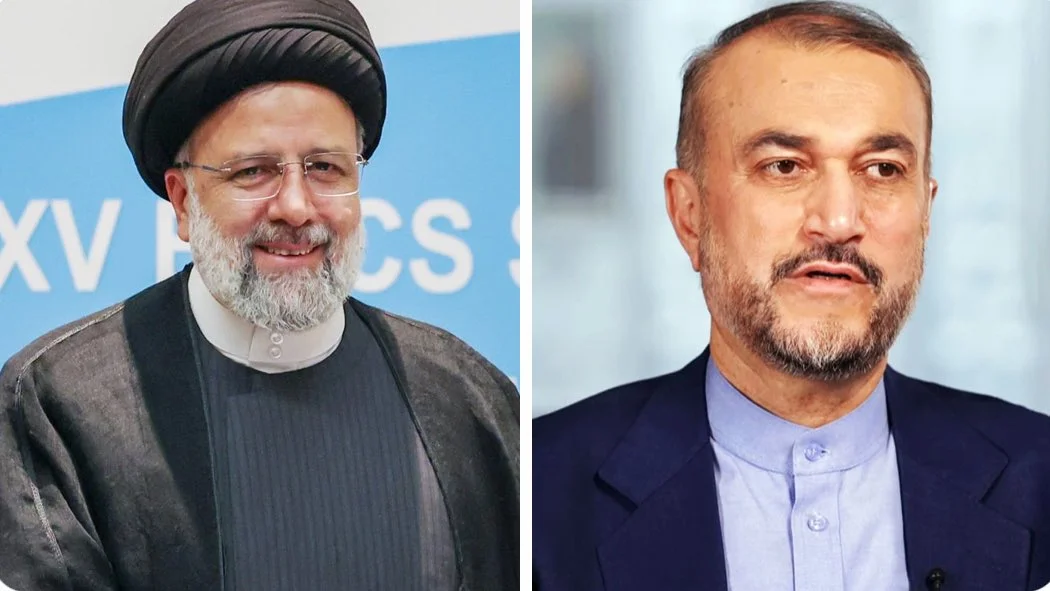
Tragedy strikes as Iranian President Ebrahim Raisi and his foreign minister lose their lives in a helicopter crash amid challenging mountainous terrain and icy weather conditions in East Azerbaijan province.
A senior Iranian official confirmed the fatalities, stating that “President Raisi, the foreign minister, and all passengers in the helicopter were killed in the crash,” as reported by Reuters.
Mehr news agency also corroborated the deaths, describing the passengers as martyred. The helicopter, carrying Raisi and Foreign Minister Hossein Amirabdollahian, was engulfed in flames upon crashing, leaving no survivors.
While images from the crash site depict the aircraft slammed into a mountain peak, the official cause of the crash remains undisclosed. The U.S.-made Bell 212 helicopter was reportedly transporting Raisi, who assumed office in 2021, known for his firm stance on morality laws and involvement in crucial nuclear negotiations.
Iranian Supreme Leader Ayatollah Ali Khamenei sought to reassure the nation, emphasizing the continuity of state affairs despite the tragic loss. Rescue efforts battled blizzards and treacherous terrain, with no signs of life detected among the passengers upon discovery of the wreckage.
Read: Who is Mohammad Mokhber, the man set to become Iran’s interim president?
As condolences pour in from across the globe, several countries extend offers of assistance, reflecting the international solidarity in the wake of this devastating incident. The White House confirms President Joe Biden’s awareness of the crash, while China and the European Union express deep concern and offer support in any rescue efforts.
The crash comes at a time of growing dissent within Iran over an array of political, social and economic crises. Iran’s clerical rulers face international pressure over Tehran’s disputed nuclear programme and its deepening military ties with Russia during the war in Ukraine.
Since Iran’s ally Hamas attacked Israel on Oct. 7, provoking Israel’s assault on Gaza, conflagrations involving Iran-aligned groups have erupted throughout the Middle East.
In Iran’s dual political system, split between the clerical establishment and the government, it is Raisi’s 85-year-old mentor Khamenei, supreme leader since 1989, who holds decision-making power on all major policies.
For years many have seen Raisi as a strong contender to succeed Khamenei, who has endorsed Raisi’s main policies.
Raisi’s victory in a closely managed election in 2021 brought all branches of power under the control of hardliners, after eight years when the presidency had been held by pragmatist Hassan Rouhani and a nuclear deal negotiated with powers including Washington.
However, Raisi’s standing may have been dented by widespread protests against clerical rule and a failure to turn around Iran’s economy, hamstrung by Western sanctions.
Raisi had been at the Azerbaijani border on Sunday to inaugurate the Qiz-Qalasi Dam, a joint project. Azerbaijan’s President Ilham Aliyev, who said he had bid a “friendly farewell” to Raisi earlier in the day, offered assistance in the rescue.
This post was last modified on May 20, 2024 10:17 am
ISLAMABAD: One woman and 121 others were wounded when Iran launched a large-scale missile attack…
Pakistan Cancels at Least 156 Flights Amid Escalating Regional Tensions At least 156 flights operated…
Senior actor Shia LaBeouf has found himself ensnared once again in legal troubles following another…
‘Sinners’ stands atop the Academy Awards nomination list with a staggering 16 nods, including best…
President Trump signaled confidence that recent U.S. attacks against Iranian officials, including Supreme Leader Ayatollah…
The death of Iran's Supreme Leader Ali Khamenei in Saturday’s airstrikes has plunged the country…
This website uses cookies.